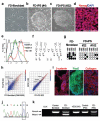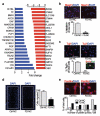Modelling pathogenesis and treatment of familial dysautonomia using patient-specific iPSCs
- PMID: 19693009
- PMCID: PMC2784695
- DOI: 10.1038/nature08320
Modelling pathogenesis and treatment of familial dysautonomia using patient-specific iPSCs
Abstract
The isolation of human induced pluripotent stem cells (iPSCs) offers a new strategy for modelling human disease. Recent studies have reported the derivation and differentiation of disease-specific human iPSCs. However, a key challenge in the field is the demonstration of disease-related phenotypes and the ability to model pathogenesis and treatment of disease in iPSCs. Familial dysautonomia (FD) is a rare but fatal peripheral neuropathy, caused by a point mutation in the IKBKAP gene involved in transcriptional elongation. The disease is characterized by the depletion of autonomic and sensory neurons. The specificity to the peripheral nervous system and the mechanism of neuron loss in FD are poorly understood owing to the lack of an appropriate model system. Here we report the derivation of patient-specific FD-iPSCs and the directed differentiation into cells of all three germ layers including peripheral neurons. Gene expression analysis in purified FD-iPSC-derived lineages demonstrates tissue-specific mis-splicing of IKBKAP in vitro. Patient-specific neural crest precursors express particularly low levels of normal IKBKAP transcript, suggesting a mechanism for disease specificity. FD pathogenesis is further characterized by transcriptome analysis and cell-based assays revealing marked defects in neurogenic differentiation and migration behaviour. Furthermore, we use FD-iPSCs for validating the potency of candidate drugs in reversing aberrant splicing and ameliorating neuronal differentiation and migration. Our study illustrates the promise of iPSC technology for gaining new insights into human disease pathogenesis and treatment.
Figures




References
-
- Yu J, et al. Induced Pluripotent Stem Cell Lines Derived from Human Somatic Cells. Science. 2007 - PubMed
-
- Takahashi K, et al. Induction of Pluripotent Stem Cells from Adult Human Fibroblasts by Defined Factors. Cell. 2007 - PubMed
-
- Park IH, et al. Reprogramming of human somatic cells to pluripotency with defined factors. Nature. 2008;451:141–146. - PubMed
-
- Dimos JT, et al. Induced Pluripotent Stem Cells Generated from Patients with ALS Can Be Differentiated into Motor Neurons. Science. 2008 - PubMed
Publication types
MeSH terms
Substances
Grants and funding
LinkOut - more resources
Full Text Sources
Other Literature Sources
Molecular Biology Databases

